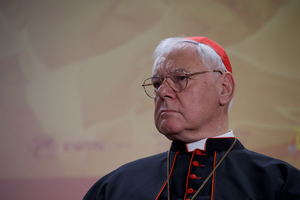Pope Urges Global Response to Protect Children From Pornography, Online Abuse
Four-day ‘Child Dignity in the Digital World’ conference brought religious and secular experts together to tackle a host of digital threats.

VATICAN CITY — In the face of extensive online threats to minors, especially internet pornography easily accessible to millions of children worldwide, Pope Francis has cautioned against a sense of paralysis, urging leaders from various sectors to “join forces” to find the “right means and approaches needed for effective responses.”
Speaking Oct. 6 to a group of religious and secular experts from around the world in Rome to attend a four-day conference on the theme “Child Dignity in the Digital World,” the Pope said, “We have to keep our eyes open and not hide from an unpleasant truth that we would rather not see.”
The conference, organized by the Pontifical Gregorian University’s Center for Child Protection, in collaboration WePROTECT, a U.K.-based global alliance to fight online sexual abuse, and the organization “Telefono Azzurro,” the first Italian help line for children at risk, brought together people from all sectors of society, including social scientists, civic leaders and religious representatives.
Conference discussions included updates on the extent of online abuse of children, its prevention, pornography, the responsibility of internet providers and the media, and ethical governance. During their audience with the Pope, participants presented him with a common declaration outlining several action points to tackle the problem.
In his discourse, the Pope drew attention to the “extremely troubling” yet increasingly frequent diffusion of problematic activities for youth, such as the spread of extreme pornography online; “sexting” on social media; online bullying; the “sextortion” of young people on the internet; human trafficking and prostitution, as well as a rise in the commissioning of live viewings of rape and violence against minors in other parts of the world.
He also referred to what has been described as the “darknet,” in which traffickers and pedophiles use secure and anonymous channels to exchange photos and information about minors; it also used for human and drug trafficking.
Global Response Needed
In tackling this global scourge, the Holy Father stressed the Church can be a leading voice given the experience it has gleaned from past mistakes in covering up clerical sex abuse, saying she “feels especially bound to work strenuously and with foresight for the protection of minors and their dignity,” both in the Church and in society.
Noting that the Church cannot do this alone, he said she stands ready by “offering her own effective and ready cooperation to all those individuals and groups in society that are committed to the same end.”
He acknowledged the “extraordinary achievements of science and technology” that are in many ways changing “our very way of thinking and of being,” but also noted the great vulnerability of children — 800 million of whom have access to the internet throughout the world.
The advantages of technology coupled by the great harm it can pose constitute “the great existential question facing humanity today, in light of a global crisis at once environmental, social, economic, political, moral and spiritual,” the Pope said.
He cautioned attendees not to “underestimate” the harm done to minors by various forms of online abuse and exploitation, including damage proven by neurobiology, psychology and psychiatry.
He also mentioned the harm inflicted on adults by aspects of digital technology, including addictions, distorted views of love and various other disorders.
It would be a delusion, Francis said, to think that, given how so many adults consume internet pornography, all adults could be “capable of effectively protecting minors.”
He also said “automatic technical solutions,” such as filters and algorithms, are not enough to deal with the problem. He said there is a need for all involved to “acknowledge and address the ethical concerns” associated with these abuses.
The Pope said it is a mistaken “ideological and mythical” belief to think that the internet is “a realm of unlimited freedom.” Rather, the crimes committed on the internet need to be fought on a global scale and require international, cross-disciplinary cooperation of parents, law enforcement, governments, NGOs and religions.
Mobilize ‘Parent Power’
Summing up the Oct. 3-6 conference, Baroness Sheila Hollins, a psychiatrist and specialist in child abuse, said the internet “needs to be a safe place to play for children” who nowadays “no longer have any more boundaries to keep them safe.”
She compared the challenge to the one the anti-tobacco lobby faced and said similar campaigning could potentially enable the removal of child pornography, pornography from children, and the harm caused by abusers.
Hollins said participants advocated “parent power” to pressurize companies to make greater efforts to prevent online abuse, an increase in awareness of the damage it causes, and the need for much greater resourcing to combat the threats. A spotlight needs to be shone “on our negligence,” she said, in order to “seek hope for the future.”
Some also suggested the Pope write an encyclical on the digital environment for children.
In his summary of the conference, Ernie Allen, an expert on the digital economy, highlighted the inadequacy of government responses and laws to tackle the problem.
The chair of the WePROTECT Global Alliance, Allen said current measures taken to protect minors such as filters have “failed miserably,” and he highlighted the need for innovation to keep children from accessing pornography. “Companies need to tailor services when users are children,” he said, and “law enforcement needs to catch up.”
Lamenting that only 52 out of 192 countries are part of Interpol’s child sexual-exploitation database, he said “challenge No. 1” is to ensure that the “world’s leaders” make this a “significant priority for everyone on the planet.”
And he advocated “public-awareness campaigns” and helpful media coverage that doesn’t simply tell “extreme stories and then distort them in the public mind.”
A constant request during the conference, he said, was for more resources to combat the problem.
Pornography’s Devastation
In comments to the Register, conference speaker Dr. Donald L. Hilton Jr. stressed the scientifically proven lasting harm caused to minors by viewing pornography. Referring to studies in Germany and England, he said the harm and addictive aspects associated with pornography are the same as those of drug use.
Hilton, an adjunct associate professor of neurosurgery at the University of Texas Health Science Center, said the internet, which is “very powerful and can cut both ways,” has dangers “we haven’t yet fully appreciated.”
He drew attention to the fact that one company — “that most people haven’t even heard of” — called Mindgeek owns “almost every porn site on the web,” which has implications when its pornographic content can be viewed for free online.
Although that should, in theory, make it easier to control, he said that “hasn’t happened” so far. Short clips of hard-core pornography can be watched for free, he said, and companies such as Mindgeek make their money because one in 10,000 will pay to view it. One site had 66 billion videos watched last year, Hilton noted; and so, with billions of people watching, “you don’t have to convert many [people to pay] to make a lot of money.”
He said some companies are understanding the “ethical and social questions being asked of them” and looking for ways to “make this safer for children.” As an example, he highlighted Britain’s Online Protection Act, which he said should be emulated.
Church’s Role
Hilton also emphasized the Church’s important role in this area, lifting up St. Thomas Aquinas as showing great understanding of how the human person and faith can be a solution. “I applaud the Catholic Church for taking a leading role in embracing a secular and religious approach,” he said. “It’s really a Thomas Aquinas approach. I see his visage coming out in this conference.”
Peter Mackay, a lawyer and former attorney general of Canada, also welcomed the degree of “commitment and focus” shown at the conference, but would have liked to see more “political leadership.”
“I tend to take a very pragmatic approach,” he said, adding that it will require a “global effort and enormous resources so children are no longer at risk.”
As a father of young children, Mackay told the Register that he is acutely aware of how “incredibly vulnerable” children are today, and as an example, noted how when a parent sent children to their room, they once “knew they would be safe, but now it is as if there are no walls and no windows.”
“You don’t feel helpless, but there is this new, daunting sense of vulnerability,” and people are “not entirely sure how to tackle it,” he said.
For him, education and raising public awareness is “critical,” especially as technology “has evolved so fast,” and in many cases, “parents know less about the internet than their children.”
“This issue is literally a runaway train,” he said, “that’s going to cause enormous, long-lasting harm unless we get up front about this effort.”
Edward Pentin is the Register’s Rome correspondent.


















